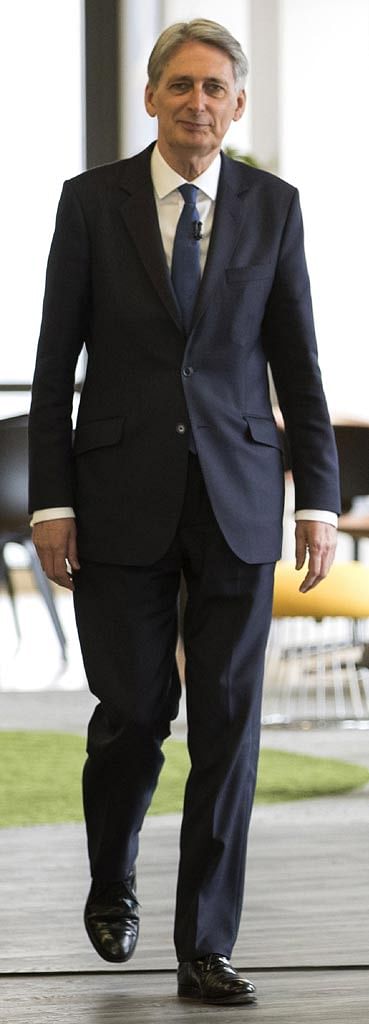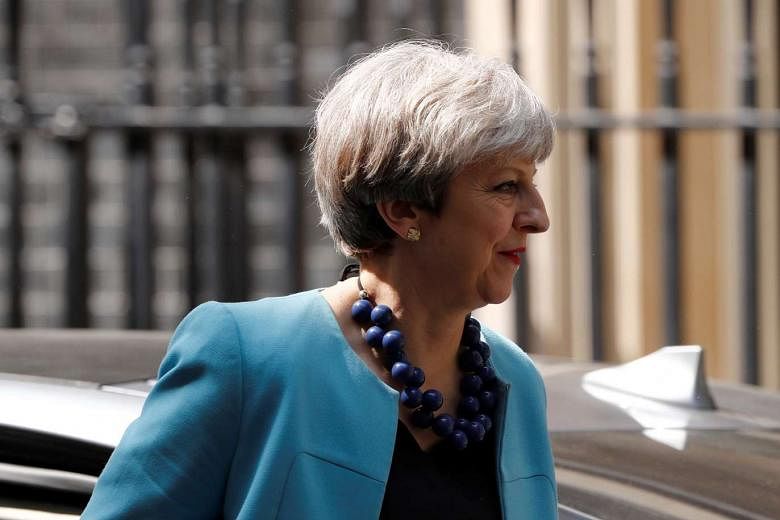With less than a week left before Britain is scheduled to launch its formal negotiations to leave the European Union (EU), British Prime Minister Theresa May is coming under intense pressure from senior figures within her government to soften her anti-European stance.
But with no overall parliamentary majority and no certainty of even getting her Cabinet approved by lawmakers, Mrs May knows that any concessions to the EU may well spark even bigger divisions within her ruling Conservative Party. Unsurprisingly, therefore, EU officials in Brussels are already casting doubt on the viability of starting next week's Brexit talks.
Mrs May must satisfy her own Conservative MPs, most of whom are anti-European, and particularly a hard core of up to 60 legislators who want Britain to cut off any links and obligations to the EU, a position known as a "hard Brexit".
But she must also satisfy the business community, which fears the consequences of a departure from the EU, and especially the financial sector in London, the world's largest, which accounts for about a fifth of the national economy, generates a third of all British tax revenues and has an interest in a "soft Brexit" which keeps as many links as possible with the EU.
Mrs May's initial approach to the dilemma was to appease the anti-EU hardliners first, in the hope of accommodating the "soft-Brexiters" later. She publicly embraced a hard Brexit stance by announcing that she intends to pull out of the EU's single market in order to stop EU citizens from continuing to seek work in Britain. But she also called early elections in the hope of gaining the flexibility to negotiate concessions with Europe.
The strategy came unstuck last Thursday when the Conservatives not only failed to increase their share of MPs, but also lost their slender majority in Parliament.
The election outcome is due more to Mrs May's poor campaigning skills rather than her position on Brexit. Nevertheless, the EU question has returned to haunt her, and divisions within Conservative ranks are painfully obvious.
The first to strike are the soft Brexit supporters, led by finance minister Philip Hammond. A mere one week ago, Mr Hammond's political career was written off; he did not expect to survive a Cabinet reshuffle after an election won by the Prime Minister. But since Mrs May is now a much diminished figure, he can dictate his own terms.

And in a speech to bankers in London tomorrow night, he is widely predicted to lay down his own preference for a more moderate British negotiating stance with Europe, in order to protect London's financial institutions.
Another soft Brexit supporter with clout is Ms Ruth Davidson, the leader of the Conservatives in Scotland. Ms Davidson, who snatched no fewer than 12 parliamentary seats from the separatist Scottish National Party and is the rising star in British politics, attended her first meeting of the British Cabinet this week and immediately pledged to "forcefully" make the case for an "open Brexit", one that puts free trade before the need to impose immigration controls.
The Prime Minister's official spokesman claims that her opinion on the EU "has not changed". Still, the balance inside her government has shifted. The appointment of Mr Damian Green as Britain's de facto deputy prime minister is significant; he campaigned for Britain to remain in the EU. So is the elevation of Mr Greg Clark as business secretary. An economist by training, Mr Clark is reputed to encourage businessmen to break their silence and start advocating what they really want from Brexit.
If she is so inclined, there are plenty of concessions Mrs May can offer Europe. She could, for instance, accept that EU citizens would continue to have access to Britain's labour markets, or that EU judges would continue to have some powers to interpret treaties and obligations to which Britain remains a party; that may facilitate Britain's continued membership in a Customs union with the rest of Europe and minimise trade disruption.
The snag for Mrs May is that none of this would be acceptable to the hardcore anti-EU Conservative MPs whose support she needs if she is to stay in power. Although the hard-Brexiters remain silent for the moment, they are bound to pounce at any sign that the Prime Minister is about to soften her stance.
And with discussions on the formation of a new Cabinet still far from being concluded, it is not even clear that the EU talks will begin as scheduled next week.
"I am not suggesting there is any confusion," Mrs May's spokesman told journalists. The rest of Europe probably begs to differ.


